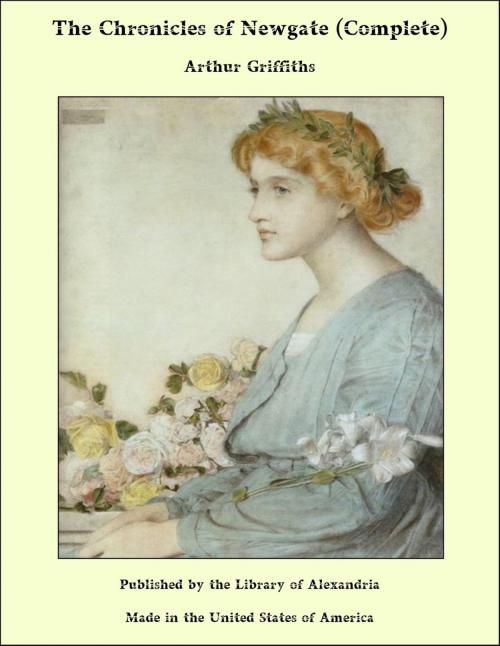The Chronicles of Newgate (Complete)
Nonfiction, Religion & Spirituality, New Age, History, Fiction & Literature| Author: | Arthur George Frederick Griffiths | ISBN: | 9781465604163 |
| Publisher: | Library of Alexandria | Publication: | March 8, 2015 |
| Imprint: | Language: | English |
| Author: | Arthur George Frederick Griffiths |
| ISBN: | 9781465604163 |
| Publisher: | Library of Alexandria |
| Publication: | March 8, 2015 |
| Imprint: | |
| Language: | English |
IN antiquity and varied interest Newgate prison yields to no place of durance in the world. A gaol has stood on this same site for almost a thousand years. The first prison was nearly as old as the Tower of London, and much older than the Bastille. Hundreds of thousands of “felons and trespassers” have from first to last been incarcerated within. To many it must have been an abode of sorrow, suffering, and unspeakable woe, a kind of terrestrial inferno, to enter which was to abandon every hope.Imprisonment was often lightly and capriciously inflicted in days before our liberties were fully won, and innumerable victims of tyranny and oppression have been lodged in Newgate. Political troubles also sent their quota. The gaol was the halfway-house to the scaffold or the gallows for turbulent or short-sighted persons who espoused the losing side; it was the starting-place for that painful pilgrimage to the pillory or whipping-post which was too frequently the punishment for rashly uttered libels and philippics against constituted power. Newgate, again, was on the high road to Smithfield; in times of intolerance and fierce religious dissensions numbers of devoted martyrs went thence to suffer for conscience’ sake at the stake. For centuries a large section of the permanent population of Newgate, as of all gaols, consisted of offenders against commercial laws. While fraudulent bankrupts were hanged, others more unfortunate than criminal were clapped into gaol to linger out their lives without the chance of earning the funds by which alone freedom could be recovered. Debtors of all degrees were condemned to languish for years in prison, often for the most paltry sums. The perfectly innocent were also detained. Gaol deliveries were rare, and the boon of arraignment and fair trial was strangely and unjustly withheld, while even those acquitted in open court were often haled back to prison because they were unable to discharge the gaoler’s illegal fees. The condition of the prisoners in Newgate was long most deplorable. They were but scantily supplied with the commonest necessaries of life. Light scarcely penetrated their dark and loathsome dungeons; no breath of fresh air sweetened the fetid atmosphere they breathed; that they enjoyed the luxury of water was due to the munificence of a Lord Mayor. Their daily subsistence was most precarious. Food, clothing, fuel were doled out in limited quantities as charitable gifts; occasionally prosperous citizens bequeathed small legacies to be expended in the same articles of supply. These bare prison allowances were further eked out by the chance seizures in the markets; by bread forfeited as inferior or of light weight, and meat declared unfit to be publicly sold. All classes and categories of prisoners were herded indiscriminately together: men and women, tried and untried, upright but misguided zealots with hardened habitual offenders. The only principle of classification was a prisoner’s ability or otherwise to pay certain fees; money could purchase the squalid comfort of the master’s side, but no immunity from the baleful companionship of felons equally well furnished with funds and no less anxious to escape the awful horror of the common side of the gaol. The weight of the chains, again, which, till quite recently, innocent and guilty alike wore, depended upon the price a prisoner could pay for “easement of irons,” and it was a common practice to overload a new-comer with enormous fetters and so terrify him into lavish disbursement. The gaol at all times was so hideously overcrowded that plague and pestilence perpetually ravaged it, and the deadly infection often spread into the neighbouring courts of law.
IN antiquity and varied interest Newgate prison yields to no place of durance in the world. A gaol has stood on this same site for almost a thousand years. The first prison was nearly as old as the Tower of London, and much older than the Bastille. Hundreds of thousands of “felons and trespassers” have from first to last been incarcerated within. To many it must have been an abode of sorrow, suffering, and unspeakable woe, a kind of terrestrial inferno, to enter which was to abandon every hope.Imprisonment was often lightly and capriciously inflicted in days before our liberties were fully won, and innumerable victims of tyranny and oppression have been lodged in Newgate. Political troubles also sent their quota. The gaol was the halfway-house to the scaffold or the gallows for turbulent or short-sighted persons who espoused the losing side; it was the starting-place for that painful pilgrimage to the pillory or whipping-post which was too frequently the punishment for rashly uttered libels and philippics against constituted power. Newgate, again, was on the high road to Smithfield; in times of intolerance and fierce religious dissensions numbers of devoted martyrs went thence to suffer for conscience’ sake at the stake. For centuries a large section of the permanent population of Newgate, as of all gaols, consisted of offenders against commercial laws. While fraudulent bankrupts were hanged, others more unfortunate than criminal were clapped into gaol to linger out their lives without the chance of earning the funds by which alone freedom could be recovered. Debtors of all degrees were condemned to languish for years in prison, often for the most paltry sums. The perfectly innocent were also detained. Gaol deliveries were rare, and the boon of arraignment and fair trial was strangely and unjustly withheld, while even those acquitted in open court were often haled back to prison because they were unable to discharge the gaoler’s illegal fees. The condition of the prisoners in Newgate was long most deplorable. They were but scantily supplied with the commonest necessaries of life. Light scarcely penetrated their dark and loathsome dungeons; no breath of fresh air sweetened the fetid atmosphere they breathed; that they enjoyed the luxury of water was due to the munificence of a Lord Mayor. Their daily subsistence was most precarious. Food, clothing, fuel were doled out in limited quantities as charitable gifts; occasionally prosperous citizens bequeathed small legacies to be expended in the same articles of supply. These bare prison allowances were further eked out by the chance seizures in the markets; by bread forfeited as inferior or of light weight, and meat declared unfit to be publicly sold. All classes and categories of prisoners were herded indiscriminately together: men and women, tried and untried, upright but misguided zealots with hardened habitual offenders. The only principle of classification was a prisoner’s ability or otherwise to pay certain fees; money could purchase the squalid comfort of the master’s side, but no immunity from the baleful companionship of felons equally well furnished with funds and no less anxious to escape the awful horror of the common side of the gaol. The weight of the chains, again, which, till quite recently, innocent and guilty alike wore, depended upon the price a prisoner could pay for “easement of irons,” and it was a common practice to overload a new-comer with enormous fetters and so terrify him into lavish disbursement. The gaol at all times was so hideously overcrowded that plague and pestilence perpetually ravaged it, and the deadly infection often spread into the neighbouring courts of law.















